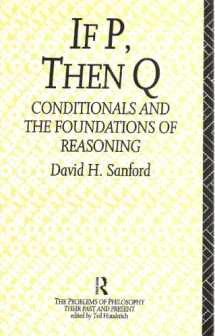
If P Then Q: Conditionals and the Foundations of Reasoning (PROBLEMS OF PHILOSOPHY THEIR PAST AND PRESENT)
ISBN-13:
9780415079945
ISBN-10:
0415079942
Edition:
Reprint
Author:
David Sanford
Publication date:
1992
Publisher:
Routledge
Format:
Paperback
280 pages
FREE US shipping
on ALL non-marketplace orders
Marketplace
from $3.51
USD
Marketplace offers
Seller
Condition
Note
Seller
Condition
Used - Good
heavy annotating throughout the book
Book details
ISBN-13:
9780415079945
ISBN-10:
0415079942
Edition:
Reprint
Author:
David Sanford
Publication date:
1992
Publisher:
Routledge
Format:
Paperback
280 pages
Summary
If P Then Q: Conditionals and the Foundations of Reasoning (PROBLEMS OF PHILOSOPHY THEIR PAST AND PRESENT) (ISBN-13: 9780415079945 and ISBN-10: 0415079942), written by authors
David Sanford, was published by Routledge in 1992.
With an overall rating of 3.5 stars, it's a notable title among other
books. You can easily purchase or rent If P Then Q: Conditionals and the Foundations of Reasoning (PROBLEMS OF PHILOSOPHY THEIR PAST AND PRESENT) (Paperback) from BooksRun,
along with many other new and used
books
and textbooks.
And, if you're looking to sell your copy, our current buyback offer is $0.6.
Description
Conditionals play a central role in our everyday thinking about the world and in our deliberations about how we should act. In this volume, David Sanford provides an account of the history of dispute about conditional statements, which are fundamental both to logic and to a great deal of general philosophy. Without presuming either knowledge of the history or prior acquaintance with the philosophical topics that lead to an interest in conditionals, the book introduces the reader to the theoretical and philosophical problems they pose. The first part of the volume traces the history of theories of conditional sentences from the Stoics to the present, examining ancient and medieval logic and the importance of conditionals in philosophy to modern thinkers such as Frege, Russell, Wittgenstein, Goodman and Stalnaker. In the latter part of the book, the author sets out a new theory of conditionals. This book should be of interest to undergraduates, postgraduates and academics of philosophical logic.


We would LOVE it if you could help us and other readers by reviewing the book
Book review

Congratulations! We have received your book review.
{user}
{createdAt}
by {truncated_author}


